You must do what you should do. It’s why you were created and exist on the planet.
In a world that tries to lull many individuals into mediocrity, it’s those who refuse to live in the middle, who choose to take charge and rise to the level of their potential – they’re the ones who set the example and serve as an inspiration to everyone.
It’s leaders, visionaries, strong-willed individuals who build businesses that make everyone stop and take notice.
The journey that teaches us lessons about fighting the good fight, failing and trying again and again, until success is inevitable.
These are the stories that connect and shape us.
Everyone has a story.
Welcome to Mark Brodinsky You Matter Storytelling.
________________________________________________________________________________
Mark Brodinsky You Matter Storyelling: Making My Past Self Proud

“Don’t seek validation from a world that crucified the perfect man.” – Anonymous
Sage Farhad says this is the way he chooses to live his life. For Sage, at the ripe old age of 22, his philosophy seems to be working: no more seeking validation, instead simply being all that he can be. Sage is making big strides and showing how a young man, focused on faith, a positive mindset and hard work can turn his life around.
Not that it’s easy. But it’s worth it.
Sage is a Field Sales Leader at USHEALTH Advisors. Since coming to USHA, Sage has written more than $2,600,000 in personal insurance policies and more importantly has led his teams to more than $26 million in production. It’s quite the accomplishment and a journey that began before Sage had entered his 2nd decade on the planet.
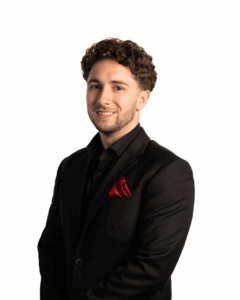
“I sought validation and I wanted to be accepted,” says Sage. “I wanted to be liked by my peers, which led to me surrounding myself with people who didn’t have my best interest in mind, surrounding myself with people whose goals and aspirations didn’t align with mine. Therefore, I started to become those people.”
And it wasn’t long before Sage’s “becoming” was getting him in hot water and dangerous situations. His less-than-smooth transition from an all-boys Catholic school to Florida State, revealed a lot about his environment and his decision-making.
“The turning point in my life was the first thing that happened,” says Sage, “I was 18 years old, and I got arrested for a nonviolent crime, resisting arrest. I ran on foot from a cop, not a smart decision. I’d take that back if I could, but that showed me that every action has a consequence, good or bad. And it doesn’t matter if you’re at the best high school, the worst high school, the best athlete, or the valedictorian, there’s a punishment, or there’s a consequence for every action. And then the second thing that happened was two months later, right after high school graduation, I got into a really bad car accident. I was a backseat passenger. The driver was an acquaintance and I knew this person was a reckless driver. Getting into that car, I asked if the guy if he had been drinking prior. He said, “No.” Turns out he had been drinking, we got into a car accident, we rear-ended somebody then veered off and hit a guardrail, which knocked out three of my front teeth, broke a portion of my jaw, my palate, and some ribs. I ended up with residual lower back pain and neck pain, and have had it since then.”
“That just showed me that everything can be taken away in an instant. So don’t take anything for granted. Be grateful for what you have. And I think those two moments were God intervening. A lot of people said, “Oh, you weren’t driving the car. That wasn’t your fault.” It was entirely my fault, I got into that car. That was a conscious decision, but I believe that’s what God will do, he’ll either change you, change the situation, or both. And that’s what he did for me. I wasn’t listening. So he changed my situation being that now I have an arrest on my record. And then he changed me, literally changed my physical image, with missing teeth which made me very self-conscious. Then I went off to Florida State and I called that my purgatory period, where I really just sat with myself reflected, and looked at my life and where I wanted to be. That’s when, at the time, my father Michael had already been working at USHEALTH Advisors, I believe for about three years. I saw him achieving great success as a Field Training Agent (FTA), and I always thought, if he can do it, why can’t I?

You might think Sage’s dad Michael, who was leading and serving his team at USHA wanted his son to join him at the company, but it was not the case. To the family, college mattered more.
“Contrary to what most people probably think, no, my dad did not recommend this for me,” says Sage. “He didn’t graduate college. Nobody on my father’s side of the family had graduated college. My mother was the only one on her side to graduate college. So it was very important to the family that I’d be the first Farhad to ever do it. So no, not at all. I actually had to broker a deal with my dad to be able to stay at USHA. I had to hit my $100,000 in annual volume in eight weeks to stay on at the company, and if I didn’t, I was going right back to school. So no, he was not for it at all.”
But Sage got to work and worked hard.
“When I first came to USHA, I still didn’t fully understand the value of a dollar or the value of a hundred dollars. I was 19 years old. I just knew that my why was I wanted to make my self proud and I wanted to make my father proud. At this point, I was viewed, I guess you could say, a troubled child. I had burned a lot of the trust that I had with my family, so I wanted to prove to them that I am putting in effort, I am making a 180 degree turn. So when I first started, I wasn’t looking at my weekly paycheck. I was looking at all the benchmarks, I wanted all the trophies, I wanted all the hardware, and I wanted to be Sage Farhad. I didn’t want to be Michael Farhad’s son.”
“I knew, of course, coming in this opportunity as a successful leader’s son, there would be a perspective that, “Oh, he gets the special leads, or he gets this or that handed to him. The bar was set high and others were watching and saying, “Oh, he’s got to be a million dollar producer, or it’s a bust. Or if he is a million dollar producer, he is getting handouts or he is getting this and that.” So it was a lose-lose situation, but to me, again, that’s seeking validation from other people in a world that crucified a perfect man, it didn’t matter to me.”
On the final day of the eighth week at USHEALTH Advisors, Sage hit his $100,000 AV milestone. He did what his father said he must do.
Now he could stay.
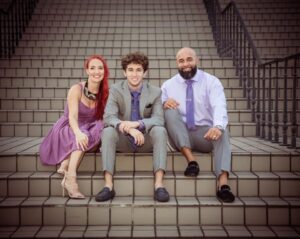
And Sage was far from finished trying. He had hit that milestone doing more than what was expected of him and never giving up.
Sage recalls: “I’ll give you a typical day. At the beginning we had what’s called ramp up. We would do them Monday, Wednesday, Friday, and then a Saturday hot seat ramp up, which also started at 7:30 AM. What a ramp up is is essentially getting you in the mindset, getting you ready to get on the phone to talk to customers. And it would not be easy situations or examples – like when a prospect is trying to get you off the phone, saying they’re already covered, they’re not interested, and it was hard doing these exercises in front of 20 to 30 other people, leaders, new agents. So a lot of pressure. But I knew just like in sports, just like in school, the person who throws themselves into the fire, that’s how they win. So Monday, Wednesday, Friday, and Saturday, that was the time I’m getting beaten up in the early morning, but I was always volunteering whether I knew the answer, whether I didn’t know the answer. I’d rather fail in practice than fail in the game.”
“I just wanted to get my reps in. The other thing was I’ve always, always thought it was really important to go into the day with some type of positive mindset. So I always did what was called PRE and it’s a three letter acronym, it’s Pray, Read, Exercise. I still do. So before I ever go into the office, first thing I do in the morning is I pray, I thank God for allowing me to wake up, and I thank God for my five senses every day. And then the second thing I do is on the way to the office, or on the way to the gym, I listen to an audio book.”
“And why not, because that’s not going to take up any more time, I’m already going to make that drive. Might as well listen to something beneficial rather than just music, going in one ear out the other. So a lot of audio books. Some books that are great are, The Four Agreements, leadership books like, The 21 Irrefutable Laws, 13 Fatal Errors. The Alchemist is great. I love the power of The Psychology of Selling, I can go on and on. Those are all great books that have helped me in my journey. And then the third thing is exercise. You have to do something for your body. I’m a firm believer that how you treat your body is a direct reflection of how you’re going to treat your business – and how you do one thing is how you do everything.”
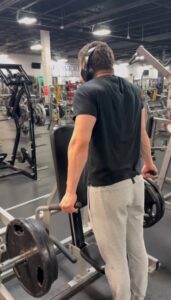
Sage’s success led to a promotion to help teach others what he had done in such a short period of time. In just over a year at USHA, Sage was asked to step into the role of Field Training Agent, following in his father’s footsteps. His dad Michael, was now a Satellite Division Sales Leader.
“My promotion was the best day of my life, because it was bigger than me,” says Sage. “At that point, I’m no longer self-employed. I’m other employed, and I’m a servant at that point. And I think I’m a much better leader than I ever was an agent. I was a good producer. I did just over a million in sales my first year. And obviously there are individuals that are doing much more than that. But as a leader, I feel that I excelled a lot more because it gave me the opportunity to express how much I cared, not just about the opportunity, not just making a significant income, but to be there for my agents. My superpower, or my cheat code is I care a lot, sometimes too much. Sometimes I wear it on my sleeve. If one of my agents is having a rough day, sometimes that’ll wear on me, where I’ll go to sleep thinking about it. I’m thinking about their problems and the trials and tribulations that they’re going through and all the different solutions I can come up with and what I could do to make their life a little bit easier.”
“But leadership was a blessing because it symbolized the growth, where the past me was not a leader. He was a follower. This Sage made a 180, he’s now a leader. He now knows what it takes to be successful, to show good character, to have a good mindset and a good attitude. And he’s been entrusted to relay and teach this. I was 21 years old at the time. So very young in the industry, and individuals on my team who were much older than me and some younger than me. But having to mentor, train, develop all types of individuals, all different demographics, all different cultures, it all just symbolized the transition I’d made going from being a follower to being a leader. I had prayed during those tough times when I got arrested and when I got in a car accident. I always had an image in my head of that version of the old Sage, tattered clothing, on his knees, crying. And there was another version of Sage I’d think about, in a suit, extending a hand. And I felt like now I had finally achieved that image.
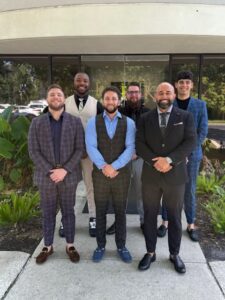
Now Sage has the suit and the position, and it’s because he developed the mental, emotional, physical and financial ability to help others. It’s a position in life that is full of gratifying moments and plenty of challenges. Because sales, like the rest of life is filled with peaks and valleys.
“What fills me up is when I came to this opportunity, like most individuals that come to a new career, they’re not in a great financial spot. They’re not in a great spot overall. So for me, seeing a new agent, seeing the stress they’re carrying on their shoulders because of the bills they have, the debt they have, their relationships that might be falling apart and being able to, fast forward three, six, 12 months down the road and see the the weight lifted off their shoulders, seeing them no longer have debt, seeing them no longer have those troubles with bills, or other people, that really fills my cup. Not that I did it, they did, but knowing that I played a part in it, knowing I had a hand in it and I could help them is so gratifying because one thing I was taught from the beginning, an agent’s success is the team’s success. It’s never just my success and I love that.”
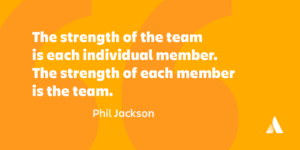
“My biggest challenge has been enabling because I care so much. My career is like my ministry in life. But I can’t help one agent more than another, just because that agent is doing better and I can’t do too much for them. They have to learn too. So limiting my care, and being very, very critical of myself as a leader is important. What my Senior Regional Leader Jason Greif taught me is if your team loses, it’s your fault, if your team wins, it’s your fault. And I think it’s a great message, I think because it speaks on the importance of accountability.”
“And so the team has lost, and we’ve lost a lot, but that’s what winning is, losing a lot. You have to be able to handle it. The way to win is by losing a lot. I used to eat myself alive thinking about what I could have or should have done to change the outcome. But you have to stay neutral. It all comes full circle because as an agent, there are highs and lows. As a leader, there are highs and lows. And just like as an agent you might have a record week, then the following week you may not get a single sale. But we always like to say, you may have a bad week, but you don’t want to have a bad month, you definitely don’t want to have a bad year. So you have to stay neutral. You can’t get too high, can’t get too low. Just because it is mentally draining if you’re just constantly going like this, because sales naturally will be like this.”
Just like day-to-day life. Ups and downs. Moments of joy and pain. It’s about being strong enough to navigate through all of it. Mindset matters. So does perspective. Because as bad as you might think it is, someone would love to live your worst day.
“My Division Sales leader, Sanquetta Taylor always grounds me,” says Sage. “She’ll always say to me when I’m having a bad day, “You’re walking, right? We’re talking. You can see me, you can hear me. You can smell. You can touch.” “Yes ma’am,” I’d say. “It’s not that bad then,” says Sanquetta. “We’re in a good spot. We’re breathing the same air.”
Sage says his philosophy is have faith first, then try your best and it will all work out. There has to be faith and then take action, because doing the work amplifies your faith.
For Sage, his faith, his effort, his mindset, his courage and his self-proclaimed superpower of caring, have all served to help him reach the ultimate goal he had when he came to USHA – to make his old self proud.
Until next time, thanks for taking the time.
Your Storyteller,
Mark Brodinsky
